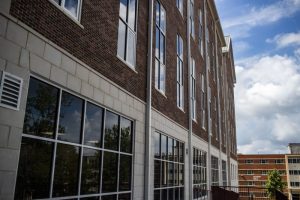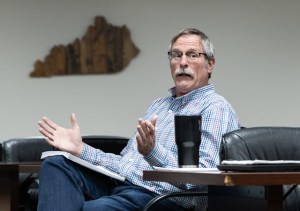Collaboration a focus at WKU’s updated health sciences complex
Published 4:14 pm Sunday, November 17, 2024

1/22
Swipe or click to see more
Western Kentucky University officials cut a ribbon for the newly completed College of Health and Human Services Community Health Sciences Complex at South Campus by the Knicely Conference Center on Friday, Nov. 15, 2024. The facility will house the LifeSkills Center for Child Welfare Education and Research, the Center for Applied Science in Health and Aging, the Institute for Rural Health, the WKU CPR Training Center, the Center for Environmental and Workplace Health, the EMPOWER Lab and other centers and resources dedicated to advance research, education and training in health and wellness.
GRACE MCDOWELL / DAILY NEWS
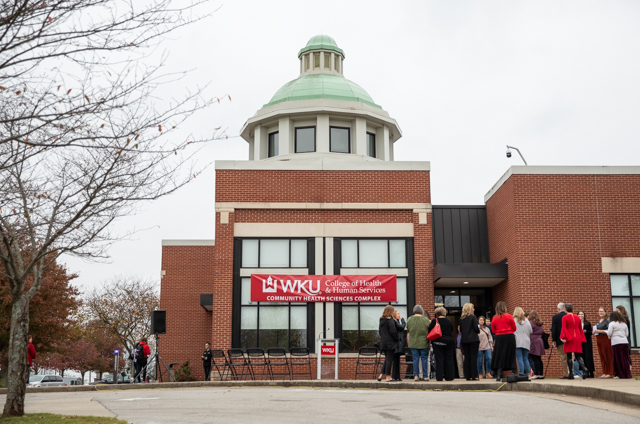
2/22
Swipe or click to see more
Western Kentucky University officials, faculty and students, as well as members of the community, gather to cut a ribbon for the newly completed College of Health and Human Services Community Health Sciences Complex at South Campus by the Knicely Conference Center on Friday, Nov. 15, 2024. The facility will house the LifeSkills Center for Child Welfare Education and Research, the Center for Applied Science in Health and Aging, the Institute for Rural Health, the WKU CPR Training Center, the Center for Environmental and Workplace Health, the EMPOWER Lab and other centers and resources dedicated to advance research, education and training in health and wellness.
GRACE MCDOWELL / DAILY NEWS

3/22
Swipe or click to see more
Western Kentucky University President Dr. Timothy Caboni speaks at a ribbon-cutting ceremony for the newly completed College of Health and Human Services Community Health Sciences Complex at South Campus by the Knicely Conference Center on Friday, Nov. 15, 2024. The facility will house the LifeSkills Center for Child Welfare Education and Research, the Center for Applied Science in Health and Aging, the Institute for Rural Health, the WKU CPR Training Center, the Center for Environmental and Workplace Health, the EMPOWER Lab and other centers and resources dedicated to advance research, education and training in health and wellness.
GRACE MCDOWELL / DAILY NEWS

4/22
Swipe or click to see more
Western Kentucky University Director of the Center for Child Welfare Education and Research Dr. Austin Griffiths speaks at a ribbon-cutting ceremony for the newly completed College of Health and Human Services Community Health Sciences Complex at South Campus by the Knicely Conference Center on Friday, Nov. 15, 2024. The facility will house the LifeSkills Center for Child Welfare Education and Research, the Center for Applied Science in Health and Aging, the Institute for Rural Health, the WKU CPR Training Center, the Center for Environmental and Workplace Health, the EMPOWER Lab and other centers and resources dedicated to advance research, education and training in health and wellness.
GRACE MCDOWELL / DAILY NEWS

5/22
Swipe or click to see more
Western Kentucky University faculty, staff and students listen as President Dr. Timothy Caboni speaks at a ribbon-cutting ceremony for the newly completed College of Health and Human Services Community Health Sciences Complex at South Campus by the Knicely Conference Center on Friday, Nov. 15, 2024. The facility will house the LifeSkills Center for Child Welfare Education and Research, the Center for Applied Science in Health and Aging, the Institute for Rural Health, the WKU CPR Training Center, the Center for Environmental and Workplace Health, the EMPOWER Lab and other centers and resources dedicated to advance research, education and training in health and wellness.
GRACE MCDOWELL / DAILY NEWS
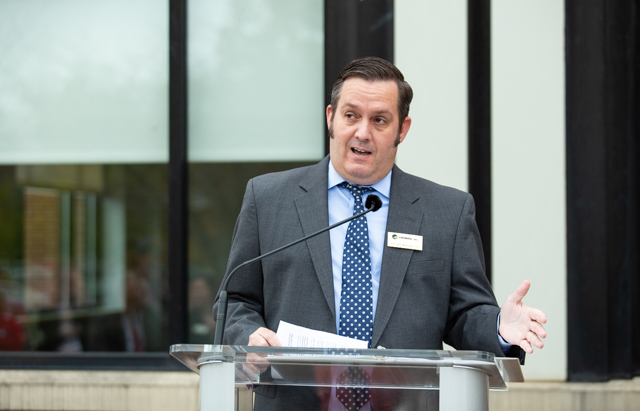
6/22
Swipe or click to see more
Joe Dan Beavers, president and CEO of LifeSkills, Inc., speaks at a ribbon-cutting ceremony for the newly completed Western Kentucky University College of Health and Human Services Community Health Sciences Complex at South Campus by the Knicely Conference Center on Friday, Nov. 15, 2024. The facility will house the LifeSkills Center for Child Welfare Education and Research, the Center for Applied Science in Health and Aging, the Institute for Rural Health, the WKU CPR Training Center, the Center for Environmental and Workplace Health, the EMPOWER Lab and other centers and resources dedicated to advance research, education and training in health and wellness.
GRACE MCDOWELL / DAILY NEWS
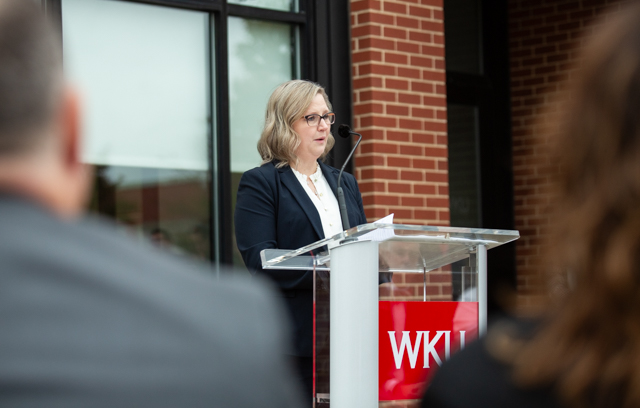
7/22
Swipe or click to see more
Commissioner of the Department for Community Based Services Lesa Dennis speaks at a ribbon-cutting ceremony for the newly completed Western Kentucky University College of Health and Human Services Community Health Sciences Complex at South Campus by the Knicely Conference Center on Friday, Nov. 15, 2024. The facility will house the LifeSkills Center for Child Welfare Education and Research, the Center for Applied Science in Health and Aging, the Institute for Rural Health, the WKU CPR Training Center, the Center for Environmental and Workplace Health, the EMPOWER Lab and other centers and resources dedicated to advance research, education and training in health and wellness.
GRACE MCDOWELL / DAILY NEWS

8/22
Swipe or click to see more
Visitors file into the newly completed Western Kentucky University College of Health and Human Services Community Health Sciences Complex at South Campus by the Knicely Conference Center to tour the facility following a ribbon-cutting ceremony on Friday, Nov. 15, 2024. The facility will house the LifeSkills Center for Child Welfare Education and Research, the Center for Applied Science in Health and Aging, the Institute for Rural Health, the WKU CPR Training Center, the Center for Environmental and Workplace Health, the EMPOWER Lab and other centers and resources dedicated to advance research, education and training in health and wellness.
GRACE MCDOWELL / DAILY NEWS

9/22
Swipe or click to see more
Visitors file into the newly completed Western Kentucky University College of Health and Human Services Community Health Sciences Complex at South Campus by the Knicely Conference Center to tour the facility following a ribbon-cutting ceremony on Friday, Nov. 15, 2024. The facility will house the LifeSkills Center for Child Welfare Education and Research, the Center for Applied Science in Health and Aging, the Institute for Rural Health, the WKU CPR Training Center, the Center for Environmental and Workplace Health, the EMPOWER Lab and other centers and resources dedicated to advance research, education and training in health and wellness.
GRACE MCDOWELL / DAILY NEWS
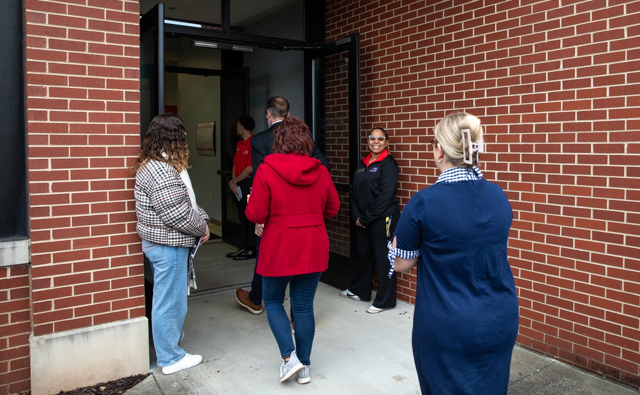
10/22
Swipe or click to see more
Visitors file into the newly completed Western Kentucky University College of Health and Human Services Community Health Sciences Complex at South Campus by the Knicely Conference Center to tour the facility following a ribbon-cutting ceremony on Friday, Nov. 15, 2024. The facility will house the LifeSkills Center for Child Welfare Education and Research, the Center for Applied Science in Health and Aging, the Institute for Rural Health, the WKU CPR Training Center, the Center for Environmental and Workplace Health, the EMPOWER Lab and other centers and resources dedicated to advance research, education and training in health and wellness.
GRACE MCDOWELL / DAILY NEWS
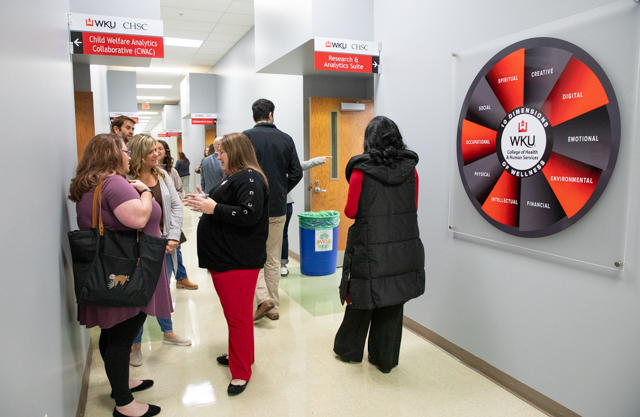
11/22
Swipe or click to see more
Visitors file into the newly completed Western Kentucky University College of Health and Human Services Community Health Sciences Complex at South Campus by the Knicely Conference Center to tour the facility following a ribbon-cutting ceremony on Friday, Nov. 15, 2024. The facility will house the LifeSkills Center for Child Welfare Education and Research, the Center for Applied Science in Health and Aging, the Institute for Rural Health, the WKU CPR Training Center, the Center for Environmental and Workplace Health, the EMPOWER Lab and other centers and resources dedicated to advance research, education and training in health and wellness.
GRACE MCDOWELL / DAILY NEWS
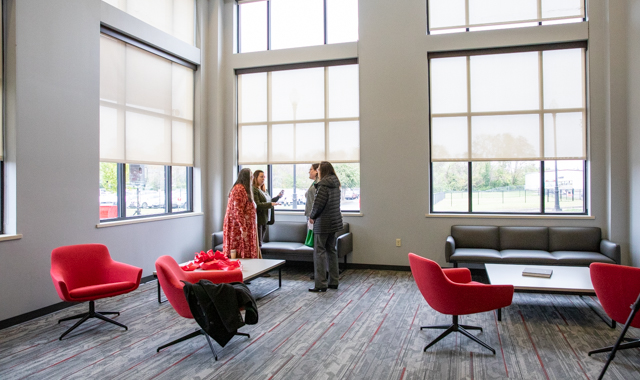
12/22
Swipe or click to see more
Visitors file into the newly completed Western Kentucky University College of Health and Human Services Community Health Sciences Complex at South Campus by the Knicely Conference Center to tour the facility following a ribbon-cutting ceremony on Friday, Nov. 15, 2024. The facility will house the LifeSkills Center for Child Welfare Education and Research, the Center for Applied Science in Health and Aging, the Institute for Rural Health, the WKU CPR Training Center, the Center for Environmental and Workplace Health, the EMPOWER Lab and other centers and resources dedicated to advance research, education and training in health and wellness.
GRACE MCDOWELL / DAILY NEWS
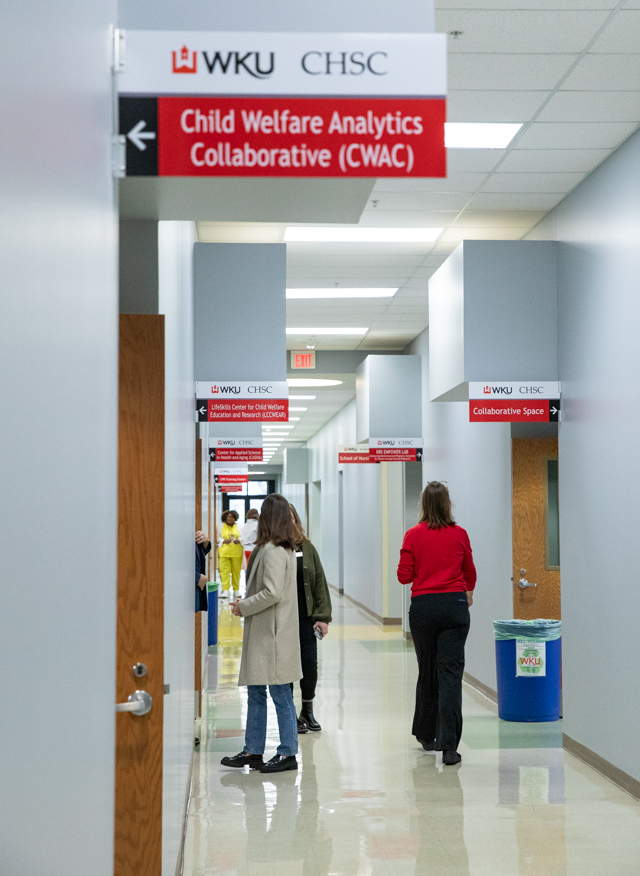
13/22
Swipe or click to see more
Visitors file into the newly completed Western Kentucky University College of Health and Human Services Community Health Sciences Complex at South Campus by the Knicely Conference Center to tour the facility following a ribbon-cutting ceremony on Friday, Nov. 15, 2024. The facility will house the LifeSkills Center for Child Welfare Education and Research, the Center for Applied Science in Health and Aging, the Institute for Rural Health, the WKU CPR Training Center, the Center for Environmental and Workplace Health, the EMPOWER Lab and other centers and resources dedicated to advance research, education and training in health and wellness.
GRACE MCDOWELL / DAILY NEWS
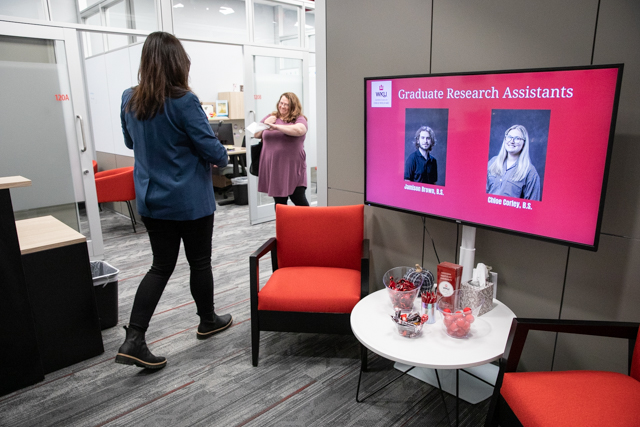
14/22
Swipe or click to see more
Visitors explore the WKU LifeSkills Center for Child Welfare Education and Research and other departments housed at the newly completed Western Kentucky University College of Health and Human Services Community Health Sciences Complex at South Campus by the Knicely Conference Center following a ribbon-cutting ceremony to officially open the facility on Friday, Nov. 15, 2024. The facility will house the LifeSkills Center for Child Welfare Education and Research, the Center for Applied Science in Health and Aging, the Institute for Rural Health, the WKU CPR Training Center, the Center for Environmental and Workplace Health, the EMPOWER Lab and other centers and resources dedicated to advance research, education and training in health and wellness.
GRACE MCDOWELL / DAILY NEWS
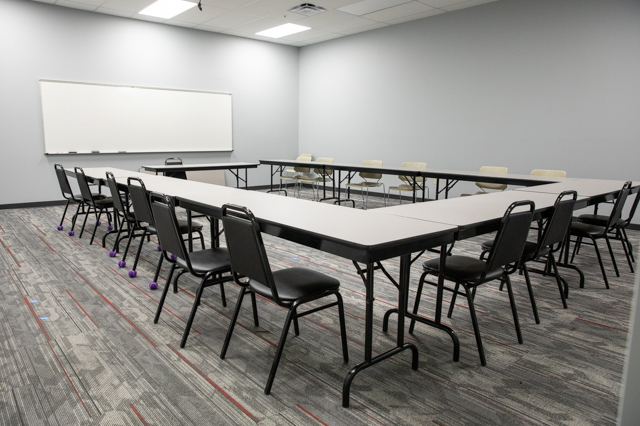
15/22
Swipe or click to see more
A collaborative space within the newly completed Western Kentucky University College of Health and Human Services Community Health Sciences Complex at South Campus by the Knicely Conference Center is lit up for visitors to see following a ribbon-cutting ceremony to officially open the facility on Friday, Nov. 15, 2024. The facility will house the LifeSkills Center for Child Welfare Education and Research, the Center for Applied Science in Health and Aging, the Institute for Rural Health, the WKU CPR Training Center, the Center for Environmental and Workplace Health, the EMPOWER Lab and other centers and resources dedicated to advance research, education and training in health and wellness.
GRACE MCDOWELL / DAILY NEWS
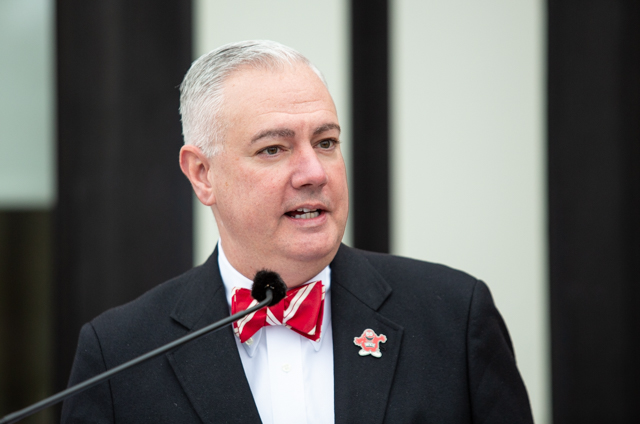
16/22
Swipe or click to see more
Western Kentucky University President Dr. Timothy Caboni speaks at a ribbon-cutting ceremony for the newly completed College of Health and Human Services Community Health Sciences Complex at South Campus by the Knicely Conference Center on Friday, Nov. 15, 2024. The facility will house the LifeSkills Center for Child Welfare Education and Research, the Center for Applied Science in Health and Aging, the Institute for Rural Health, the WKU CPR Training Center, the Center for Environmental and Workplace Health, the EMPOWER Lab and other centers and resources dedicated to advance research, education and training in health and wellness.
GRACE MCDOWELL / DAILY NEWS

17/22
Swipe or click to see more
Western Kentucky University students, staff and faculty listen as President Dr. Timothy Caboni speaks at a ribbon-cutting ceremony for the newly completed College of Health and Human Services Community Health Sciences Complex at South Campus by the Knicely Conference Center on Friday, Nov. 15, 2024. The facility will house the LifeSkills Center for Child Welfare Education and Research, the Center for Applied Science in Health and Aging, the Institute for Rural Health, the WKU CPR Training Center, the Center for Environmental and Workplace Health, the EMPOWER Lab and other centers and resources dedicated to advance research, education and training in health and wellness.
GRACE MCDOWELL / DAILY NEWS

18/22
Swipe or click to see more
Western Kentucky University College of Health and Human Services Dean Dr. Tania Basta speaks at a ribbon-cutting ceremony for the newly completed CHHS Community Health Sciences Complex at South Campus by the Knicely Conference Center on Friday, Nov. 15, 2024. The facility will house the LifeSkills Center for Child Welfare Education and Research, the Center for Applied Science in Health and Aging, the Institute for Rural Health, the WKU CPR Training Center, the Center for Environmental and Workplace Health, the EMPOWER Lab and other centers and resources dedicated to advance research, education and training in health and wellness.
GRACE MCDOWELL / DAILY NEWS
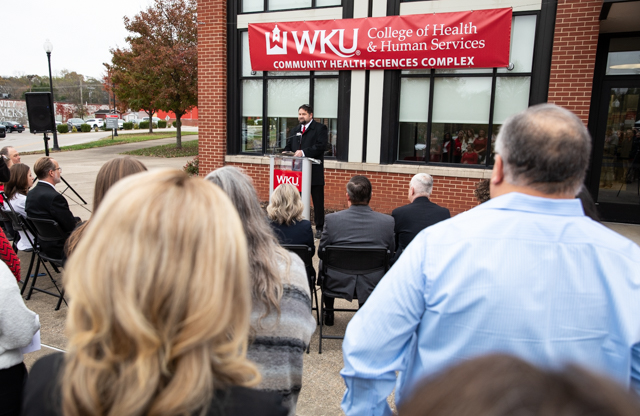
19/22
Swipe or click to see more
Western Kentucky University Director of the Center for Child Welfare Education and Research Dr. Austin Griffiths speaks at a ribbon-cutting ceremony for the newly completed College of Health and Human Services Community Health Sciences Complex at South Campus by the Knicely Conference Center on Friday, Nov. 15, 2024. The facility will house the LifeSkills Center for Child Welfare Education and Research, the Center for Applied Science in Health and Aging, the Institute for Rural Health, the WKU CPR Training Center, the Center for Environmental and Workplace Health, the EMPOWER Lab and other centers and resources dedicated to advance research, education and training in health and wellness.
GRACE MCDOWELL / DAILY NEWS
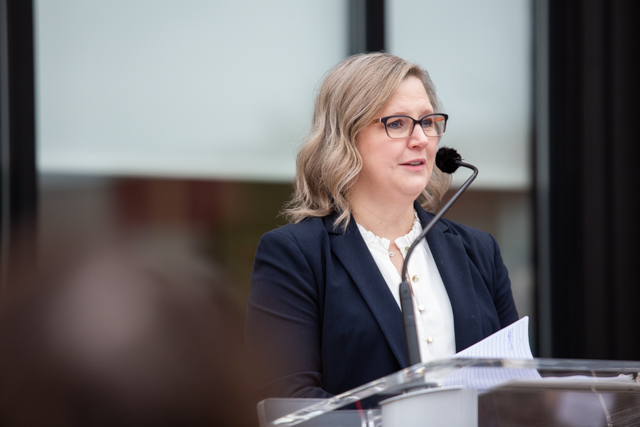
20/22
Swipe or click to see more
Commissioner of the Department for Community Based Services Lesa Dennis speaks at a ribbon-cutting ceremony for the newly completed Western Kentucky University College of Health and Human Services Community Health Sciences Complex at South Campus by the Knicely Conference Center on Friday, Nov. 15, 2024. The facility will house the LifeSkills Center for Child Welfare Education and Research, the Center for Applied Science in Health and Aging, the Institute for Rural Health, the WKU CPR Training Center, the Center for Environmental and Workplace Health, the EMPOWER Lab and other centers and resources dedicated to advance research, education and training in health and wellness.
GRACE MCDOWELL / DAILY NEWS

21/22
Swipe or click to see more
Joe Dan Beavers, president and CEO of LifeSkills, Inc., speaks at a ribbon-cutting ceremony for the newly completed Western Kentucky University College of Health and Human Services Community Health Sciences Complex at South Campus by the Knicely Conference Center on Friday, Nov. 15, 2024. The facility will house the LifeSkills Center for Child Welfare Education and Research, the Center for Applied Science in Health and Aging, the Institute for Rural Health, the WKU CPR Training Center, the Center for Environmental and Workplace Health, the EMPOWER Lab and other centers and resources dedicated to advance research, education and training in health and wellness.
GRACE MCDOWELL / DAILY NEWS
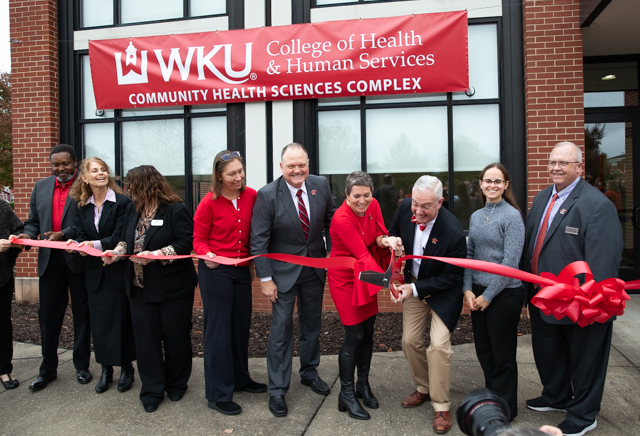
22/22
Swipe or click to see more
Western Kentucky University officials cut a ribbon for the newly completed College of Health and Human Services Community Health Sciences Complex at South Campus by the Knicely Conference Center on Friday, Nov. 15, 2024. The facility will house the LifeSkills Center for Child Welfare Education and Research, the Center for Applied Science in Health and Aging, the Institute for Rural Health, the WKU CPR Training Center, the Center for Environmental and Workplace Health, the EMPOWER Lab and other centers and resources dedicated to advance research, education and training in health and wellness.
GRACE MCDOWELL / DAILY NEWS
Western Kentucky University’s newly renovated Community Health Sciences Complex opens the door to collaboration among the six applied research centers it now houses, said Tania B. Basta, the dean of WKU’s College of Health and Human Services.
Some 100 people celebrated the renovation at a Friday ribbon-cutting for this Southern Campus complex, which Basta said had solely housed the Associate of Science in Nursing program. The renovations – which cost under $1 million, according to WKU’s Faculty Fellow for Space and Facilities Travis Wilson – have enabled the six centers to provide services under one roof.
The complex now additionally holds the Lifeskills Center for Child Welfare Education and Research, the Center of Applied Science in Health and Aging, and the Center for Environmental and Workplace Health. It also houses the Institute for Rural Health, the WKU CPR Training Center, and the EMPOWER Lab – Enhancing Motherhood and Pregnancy Outcomes for Women through Exercise Research.
WKU moved these centers into one facility “so that they could really engage in interdisciplinary research and have a hub for our faculty and students,” Basta said. The centers were previously located elsewhere or had no dedicated facility, according to Basta.
As WKU works toward becoming a Carnegie-classified “R2” institution that offers PhD programs, spaces like the complex “will prove essential in supporting PhD students and increasing research productivity,” WKU President Timothy Caboni said. These gains will raise student recruitment and faculty retention, he added.
Availability of parking makes the complex more accessible to drivers compared with WKU’s main campus, Basta said. It’s also accessible via the city and campus bus lines.
WKU has additionally received $5.8 million in external fiscal year 2024 funding for the Lifeskills center, Caboni said.
While Lifeskills previously had a Child Welfare Analytics Collaborative and Training Resource Center elsewhere, those two programs are now located at the complex’s Lifeskill center alongside its new Integrated Family Trauma Treatment Clinic.
Broadly speaking, the clinic, which has a referral process, serves children and families with some kind of clinical need, its director Austin Griffith said. It has student interns and graduate students who are research assistants, and those interested in a role can reach out, he said.
“It is a lifeline for families who have endured the painful cycles of trauma,” said Lesa Dennis, commissioner of Kentucky’s Department for Community Based Services. “It will be a beacon for hope for families and children to help them heal, reconnect and thrive by providing evidence-based trauma treatment for both children and parents.”
Dennis’ department is part of the commonwealth’s Cabinet for Health and Family Services, which Griffith said provides the clinic funding to provide “ultra-quality, evidence-based services.” This, Griffith added, gives therapists the financial support to consistently focus on providing quality services.















































